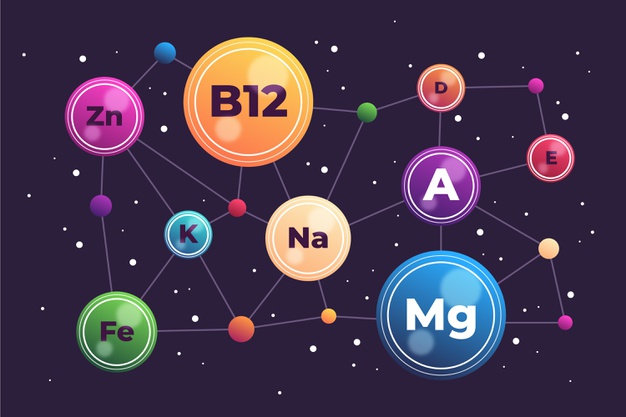Kapanlagi.com - Vitamin Deficiency can have an impact on the body's health that triggers a number of disease risks. One of them is a deficiency of vitamin B which consists of various types with various signs and symptoms. It cannot be underestimated, vitamin B deficiency can have an impact on the body's health condition such as the risk of anemia.
There are various types of vitamin B known as vitamin B complex, including vitamin B1, vitamin B2, vitamin B12, vitamin B6, vitamin B3, or vitamin B9. Based on the type of vitamin B complex, it has its own function for the body's health. It is also related to vitamin B deficiency which can cause certain signs and symptoms.
Generally, vitamin B deficiency is often associated with health problems such as anemia. Because vitamin B functions to help the formation of red blood cells. However, not only involved in the process of forming red blood cells, vitamin B plays a role in producing enzymes, maintaining eye health, nerves, and muscles.
This is the reason why vitamin B deficiency has a significant impact on the body's health condition. How to recognize vitamin B deficiency can be seen from the signs and symptoms that appear. The signs and symptoms of vitamin B deficiency can be found in the following review. Here are the signs and symptoms of vitamin B deficiency that have been summarized by kapanlagi.com from various sources.
1. Vitamin B1 (Thiamine) Deficiency

(credit: pixabay.com)
The first vitamin B deficiency is related to vitamin B1. Vitamin B1, also known as thiamine, functions to maintain the nervous system and as a source of body energy. When the body has low levels of vitamin B1, it can be said that the body is deficient in vitamin B1. This can have an impact on health conditions, including triggering diseases such as beriberi.
The body needs vitamin B1 to break down sugar molecules found in carbohydrates, produce fatty acids, and affect certain neurotransmitters. When experiencing a deficiency of vitamin B1, there are signs and symptoms that need to be aware of as follows, as reported by medicalnewstoday.com.
- Weight loss
- Loss of appetite
- Confusion due to memory problems
- Heart problems
- Numbness and tingling in the feet and hands
- Loss of muscle mass.
2. Lack of Vitamin B2 (Riboflavin)
The next vitamin B deficiency is vitamin B2 or known as riboflavin. Vitamin B2 is needed to produce energy, break down fats, convert tryptophan into niacin, and convert B6 into coenzyme. If there is a deficiency of vitamin B2, it can trigger various health problems that need to be aware of. This condition is often related to problems with the thyroid or endocrine disorders.
There are signs and symptoms of vitamin B2 deficiency that can be recognized by the sufferers. The signs and symptoms of vitamin B2 deficiency are as follows and important to know:
- Experiencing hair loss.
- Red and itchy eyes.
- Swelling in the mouth and throat.
- Sores at the corners of the mouth.
- Skin disorders.
To prevent it, some foods that contain vitamin B2 include cereals, yogurt, milk, mushrooms, or almonds. However, examination and consultation can be considered to help overcome health problems that occur.
3. Lack of Vitamin B3 (Niacin)

(credit: freepik.com)
The next deficiency of B complex vitamins is the type of vitamin B3. Vitamin B3 is also known as niacin. This vitamin functions to help convert food into energy, aid digestion, and support cell development as reported by healthline.com.
If the body lacks vitamin B3, it may experience several health problems that need to be aware of. This is because a deficiency of vitamin B3 can trigger certain symptoms and signs that the body can feel. The signs and symptoms of vitamin B3 deficiency are as follows, as reported by medicalnewstoday.com:
- Changes in skin color when exposed to sunlight.
- Appearance of spots on the skin and roughness.
- Bright red tongue.
- Experiencing vomiting, diarrhea.
- Constipation.
- Headaches.
- Depression.
Some foods that contain sources of vitamin B3 include chicken, fish, legumes, grains, or cereals. You can undergo examination and consultation if you experience a deficiency of vitamin B that causes certain health problems.
4. Vitamin B5 Deficiency (Pantothenic Acid)
Another deficiency of the B complex vitamins is vitamin B5. Vitamin B5 is known as pantothenic acid. According to medicalnewstoday.com, vitamin B5 functions to create coenzymes, proteins, and new fats. This can help the body process energy that plays a role in metabolism.
Although cases of vitamin B5 deficiency are rare, when the body lacks this vitamin, several signs and symptoms can be experienced by the sufferer. The signs and symptoms are as follows:
- Headaches.
- Easily angered.
- Restless and lack of sleep.
- Decreased appetite.
- Numbness in the hands and feet.
5. Vitamin B6 Deficiency (Pyridoxine)

(credit: freepik.com)
Vitamin B6 is also known as pyridoxine, which functions to convert food into energy. Vitamin B6 can also help maintain a stable immune system. Deficiency of this B complex vitamin can cause various health problems that need to be aware of.
There are several signs and symptoms when the body lacks vitamin B6 that can trigger the risk of anemia. The signs and symptoms of vitamin B6 deficiency are as follows, as reported by healthline.com:
- Experiencing confusion.
- Depression.
- Nausea.
- Experiencing anemia.
- Vulnerable to infections.
- Skin rash.
Some foods that are high in vitamin B6 include tuna, salmon, potatoes, green beans, and cereal.
6. Vitamin B7 (Biotin) Deficiency

(credit: freepik.com)
The next deficiency of B complex vitamins is a deficiency of vitamin B7. Vitamin B7 is also known as biotin. According to medicalnewstoday.com, this vitamin can help the body overcome psoriasis. In addition, vitamin B7 can also break down fats, carbohydrates, and proteins that provide nutrition to the body such as hair, skin, or nails.
Therefore, if the body lacks vitamin B7, several health problems can arise with the following signs and symptoms:
- Thinning hair.
- Rash in the eye, nose, and mouth area.
- Brittle nails.
- Depression.
- Fatigue.
7. Vitamin B9 (Folate) Deficiency

(credit: freepik.com)
Vitamin B9, also known as folate, is beneficial for pregnant women to prevent the risk of birth defects in fetuses. In this case, folate is important for the body's metabolism of amino acids, vitamin metabolism, cell division, and red blood cell growth. If there is a deficiency of vitamin B9, certain health risks may be experienced by the affected individuals.
The following are signs and symptoms of vitamin B9 deficiency as reported by healthline.com:
- Anemia.
- Difficulty concentrating and focusing.
- Easily angered.
- Headaches.
- Shortness of breath.
- Mouth sores.
- Changes in skin, hair, and nails color.
A number of foods that contain vitamin B9 can be chosen such as asparagus, oranges, nuts, leafy green vegetables, or cereals.
8. Vitamin B12 Deficiency (Cobalamin)

(credit: freepik.com)
The next deficiency of B complex vitamins is vitamin B12. Vitamin B12 is also known as cobalamin. This vitamin plays an important role in the body for the formation of red blood cells, DNA synthesis, improving brain function, and body metabolism.
Vitamin B12 deficiency can lead to various health problems that need to be aware of by everyone. The signs and symptoms of vitamin B12 deficiency can be observed through the following review:
- Easily tired.
- Weight loss.
- Experiencing constipation.
- Loss of appetite.
- Numbness and tingling in the legs and hands.
- Depression.
Those are 8 signs and symptoms of B complex vitamin deficiency that need to be aware of. Consultation and further examination can be considered to help overcome health problems that arise due to B complex vitamin deficiency.
(kpl/nlw)
Disclaimer: This translation from Bahasa Indonesia to English has been generated by Artificial Intelligence.


















